fake news
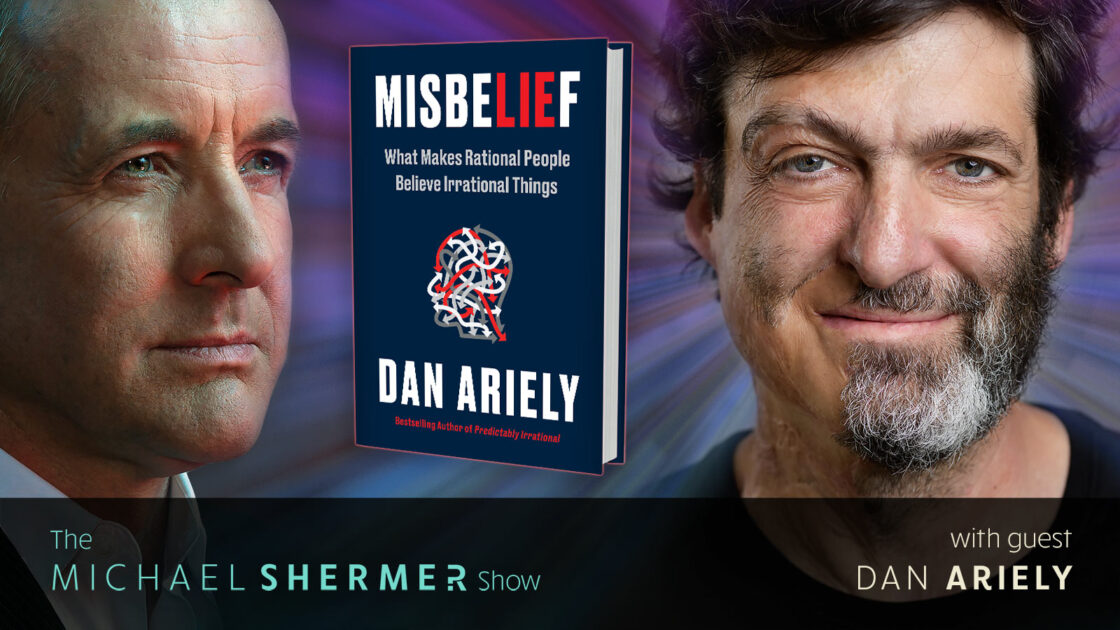
Shermer and Ariely discuss: What is disinformation and what should we do about it? • How do we know what is true and what to believe? • virtue signaling one’s tribe as a misbelief factor • the role of complex stories in misbelief • emotions, personality, temperament, trust, politics, and social aspects of belief and misbelief • the funnel of belief • social proof and the influence of others on our beliefs • a COVID-23 pandemic • social media companies…
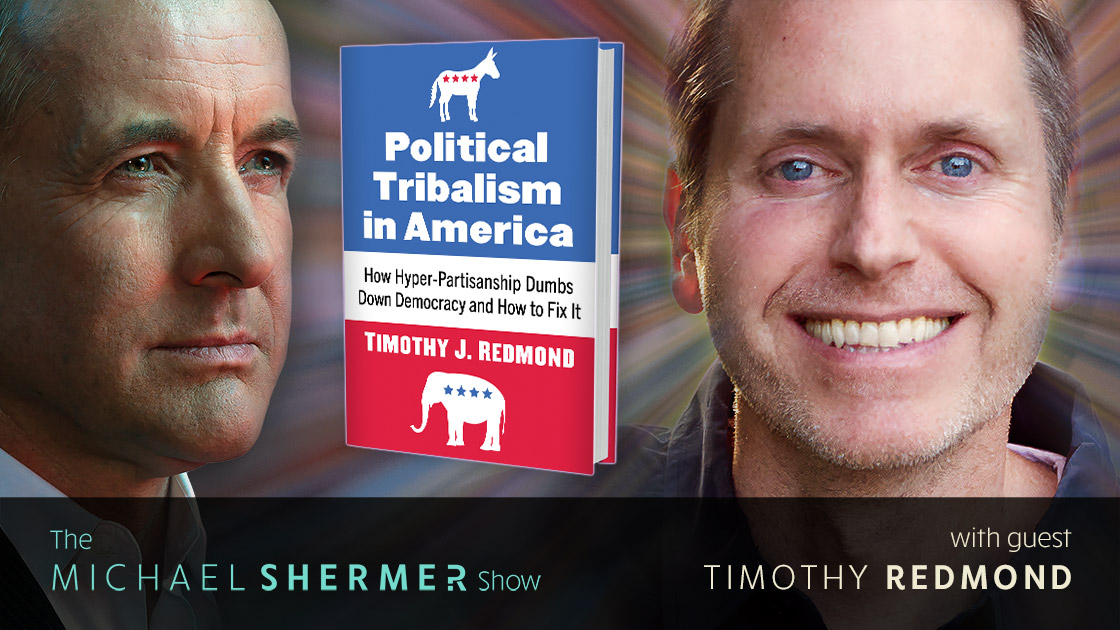
Shermer and Redmond discuss: why we have political duopoly (Duverger’s law) • parties vs. policies • Are we living in a post-truth, fake-news, alternative facts world? • How do we know political polarization is worse now than in the past? • acquiring, perceiving, and evaluating political information • evaluating: false political information, political numbers and arguments, claims of rigged election • whataboutism • cognitive responsibilities of citizenship • cognitive biases • political polarization • myside bias • numeracy vs. innumeracy…
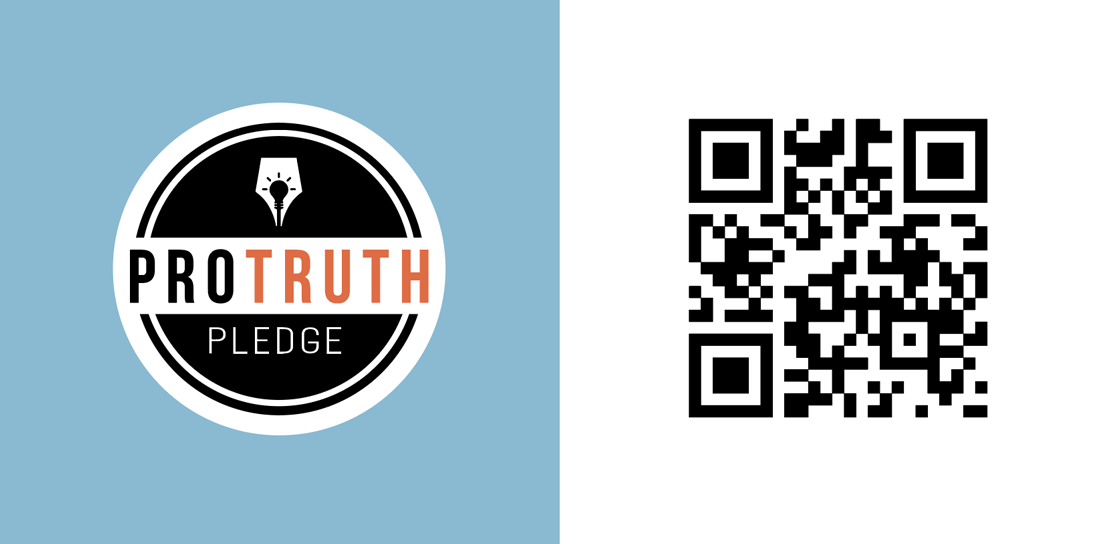
In our “post-truth” world, objective facts are less influential in shaping public opinion than appeals to emotion and personal belief. In the U.S., citizens’ trust in their government is at historically low levels, and the trust gap is difficult to bridge because individuals who practice deceptive behaviors often gain. This type of situation is known as a “tragedy of the commons.” Behavioral scientist Gleb Tsipursky offers the Pro-Truth Pledge (PTP) as one solution to help rebuild trust in and decrease…
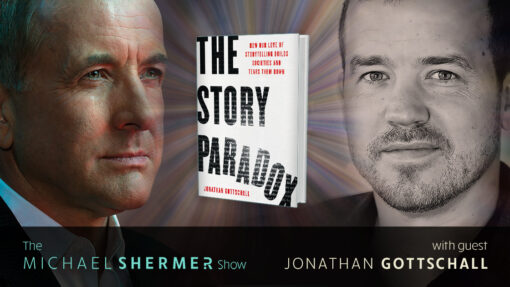
“How can we save the world from stories?” Michael Shermer speaks with Jonathan Gottschall about The Story Paradox: How Our Love of Storytelling Builds Societies and Tears Them Down. Gottschall reveals why our biggest asset has become our greatest threat, and what, if anything, can be done.
“How can we save the world from stories?” Michael Shermer speaks with Jonathan Gottschall about The Story Paradox: How Our Love of Storytelling Builds Societies and Tears Them Down. Gottschall reveals why our biggest asset has become our greatest threat, and what, if anything, can be done.
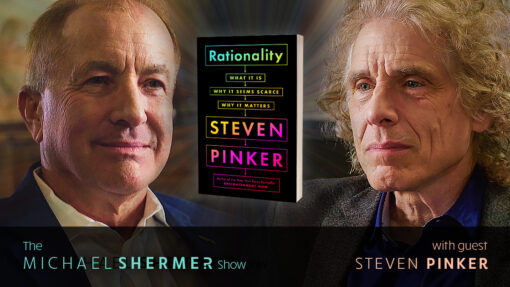
In episode 219, Michael Shermer speaks in person with Harvard psychologist Steven Pinker about his new book Rationality, about how today humanity is reaching new heights of scientific understanding — and also appears to be losing its mind. How can a species that developed vaccines for COVID-19 in less than a year produce so much fake news, medical quackery, and conspiracy theorizing?
In episode 219, Michael Shermer speaks in person with Harvard psychologist Steven Pinker about his new book Rationality, about how today humanity is reaching new heights of scientific understanding — and also appears to be losing its mind. How can a species that developed vaccines for COVID-19 in less than a year produce so much fake news, medical quackery, and conspiracy theorizing?
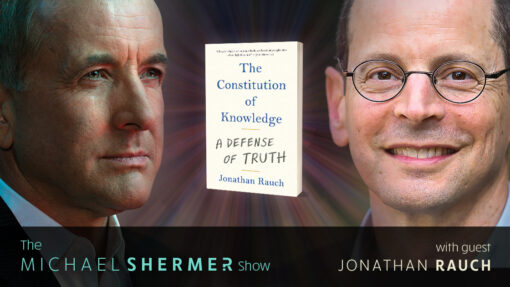
In episode 190, Michael Shermer speaks with Jonathan Rauch as he reaches back to the parallel eighteenth-century developments of liberal democracy and science to explain what he calls the “Constitution of Knowledge” — our social system for turning disagreement into truth.
In episode 190, Michael Shermer speaks with Jonathan Rauch as he reaches back to the parallel eighteenth-century developments of liberal democracy and science to explain what he calls the “Constitution of Knowledge” — our social system for turning disagreement into truth.
Right now, we are all confronting one of humanity’s scariest enemies: epidemic disease. Are we brave enough to face this horror? You bet we are! Download Junior Skeptic 76 for free: Pandemics Throughout History—How Mistakes, Fakes, and Missing Facts Make Epidemics Worse. PLUS: Dr. Michael Shermer gives a remote lecture on free speech & censorship.
In a lecture, Dr. Michael Shermer addresses one of the deepest questions of all: what is truth? Following that, Lee McIntyre and Michael Shermer debate whether we are living in a Post-Truth era of fake news and alternative facts.

Is post-truth the political subordination of reality? Is truth itself any more under threat today that in the past? Have the populists & postmodernists won the day? In response to Dr. Lee McIntyre’s essay, Dr. Michael Shermer asserts that people are not nearly as gullible as some believe.

Are we living in a Post-Truth era of fake news and alternative facts? Dr. Lee McIntyre avers that we must take seriously the threat to truth posed both by those who would subvert the truth for political gain, and also by those who would deny that such a threat actually exists.
In Science Salon # 89 Michael Shermer speaks with Richard Dawkins about his new book Outgrowing God. Dawkins explains how the natural world arose without a designer and challenges head-on some of the most basic assumptions made by the world’s religions. PLUS: Is the statement “We are living in a post-truth world” true? If your answer is “yes” then the answer is “no” because you’ve just evaluated the statement in an evidentiary manner, so evidence still matters and facts still…

Is the statement “We are living in a post-truth world” true? If your answer is “yes” then the answer is “no” because you’ve just evaluated the statement in an evidentiary manner, so evidence still matters and facts still matter. Harvard psychologist Steven Pinker explains why were are not living in a post-truth world in this deeply insightful cover story from Skeptic magazine 24.3 (2019).
VeriSign founder David Cowan avers that science is the key to combatting the spread of disinformation; PLUS, evolutionary anthropologist Michael Tomasello presents his new theory of how humans became such a distinctive species.

Fake news, crafted to exploit us, wreaks havoc on our health, finances and politics. VeriSign founder David Cowan avers that science is the key to combatting the spread of disinformation.
In Science Salon # 60 — exceptionally important conversation — Dr. Shermer discusses at length the background to and research of Dr. Nicholas Christakis, a physician and evolutionary sociologist famous for his study of social networks in humans and other animals. PLUS: The breadth of what can be meant by the word “hoax” makes the concept — and consequences — worthy of renewed study. Michelle E. Ainsworth reviews Bunk: The Rise of Hoaxes, Humbug, Plagiarists, Phonies, Post-Facts, and Fake News…
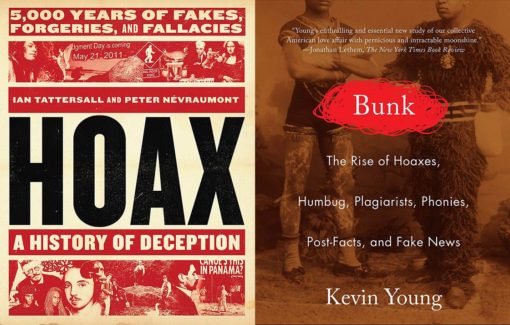
The breadth of what can be meant by the word “hoax” makes the concept — and consequences — worthy of renewed study. Michelle E. Ainsworth reviews Bunk: The Rise of Hoaxes, Humbug, Plagiarists, Phonies, Post-Facts, and Fake News by Kevin Young and Hoax: A History of Deception: 5000 Years of Fakes, Forgeries, and Fallacies by Ian Tattersall and Peter Nevraumont.

In an era of “fake news,” “post truth,” and just plain old-as-time baloney, kids need critical thinking more than ever! They need tools to sift fact from fiction when they navigate YouTube, television, and social media. To help, we created “An Easy Guide to Baloney Detection!”… DOWNLOAD the free PDF
NEXT →




















